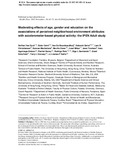Mostrar el registro sencillo del ítem
Moderating effects of age, gender and education on the associations of perceived neighborhood environment attributes with accelerometer-based physical activity: the IPEN Adult study
| dc.creator | Dyck, Delfien Van | es_ES |
| dc.creator | Cerin, Ester | es_ES |
| dc.creator | Bourdeaudhuij, Ilse de | es_ES |
| dc.creator | Salvo, Deborah | es_ES |
| dc.creator | Christiansen, Lars Breum | es_ES |
| dc.creator | MacFarlane, Duncan | es_ES |
| dc.creator | Owen, Neville | es_ES |
| dc.creator | Mitas, Josef | es_ES |
| dc.creator | Troelsen, Jens | es_ES |
| dc.creator | Aguinaga Ontoso, Inés | es_ES |
| dc.date.accessioned | 2019-04-03T07:22:23Z | |
| dc.date.available | 2019-04-03T07:22:23Z | |
| dc.date.issued | 2015 | |
| dc.identifier.issn | 1353-8292 (Print) | |
| dc.identifier.issn | 1873-2054 (Electronic) | |
| dc.identifier.uri | https://hdl.handle.net/2454/32792 | |
| dc.description.abstract | The study's purpose was to examine age, gender, and education as potential moderators of the associations of perceived neighborhood environment variables with accelerometer-based moderate-to-vigorous physical activity (MVPA). Data were from 7273 adults from 16 sites (11 countries) that were part of a coordinated multi-country cross-sectional study. Age moderated the associations of perceived crime safety, and perceiving no major physical barriers to walking, with MVPA: positive associations were only found in older adults. Perceived land use mix-access was linearly (positive) associated with MVPA in men, and curvilinearly in women. Perceived crime safety was related to MVPA only in women. No moderating relationships were found for education. Overall the associations of adults’ perceptions of environmental attributes with MVPA were largely independent of the socio-demographic factors examined. These findings are encouraging, suggesting that efforts to optimize the perceived built and social environment may act in a socially-equitable manner to facilitate MVPA. | en |
| dc.description.sponsorship | All authors declare financial support for the submitted work from the National Cancer Institute of the National Institutes of Health. | en |
| dc.format.extent | 21 p. | |
| dc.format.mimetype | application/pdf | en |
| dc.language.iso | eng | en |
| dc.publisher | Elsevier | en |
| dc.relation.ispartof | Health & Place 36 (2015) 65–73 | en |
| dc.rights | © 2015 Elsevier Ltd. This manuscript version is made available under the CC-BY-NC-ND 4.0. | en |
| dc.rights.uri | https://creativecommons.org/licenses/by-nc-nd/4.0/ | |
| dc.subject | Exercise | en |
| dc.subject | Environmental health | en |
| dc.subject | Health policy | en |
| dc.subject | Multilevel modeling | en |
| dc.subject | Public health | en |
| dc.title | Moderating effects of age, gender and education on the associations of perceived neighborhood environment attributes with accelerometer-based physical activity: the IPEN Adult study | en |
| dc.type | info:eu-repo/semantics/article | en |
| dc.type | Artículo / Artikulua | es |
| dc.contributor.department | Ciencias de la Salud | es_ES |
| dc.contributor.department | Osasun Zientziak | eu |
| dc.rights.accessRights | info:eu-repo/semantics/openAccess | en |
| dc.rights.accessRights | Acceso abierto / Sarbide irekia | es |
| dc.identifier.doi | 10.1016/j.healthplace.2015.09.007 | |
| dc.relation.publisherversion | https://doi.org/10.1016/j.healthplace.2015.09.007 | |
| dc.type.version | info:eu-repo/semantics/acceptedVersion | en |
| dc.type.version | Versión aceptada / Onetsi den bertsioa | es |



